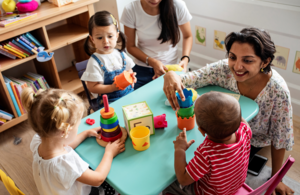A strong foundation in the early years is crucial to children’s success
Ofsted has today published the second part in its series of research reviews drawing on a range of research relating to early years education.

The report highlights that frequent interactions between children and adults are fundamental to developing all young children’s knowledge in the prime areas of learning – communication and language, physical development and personal, social and emotional development (PSED). Every interaction between a practitioner and a child plays an important role in building the knowledge and skills children will need. High-quality interactions are more likely to take place when:
- practitioners are aware of what children already know and can do and respond accordingly
- practitioners know the curriculum they want children to learn in advance
- all children experience enough planned and incidental interactions with adults to learn what they need to know
Read the ‘Best start in life part 2: the 3 prime areas of learning’ report.
While high-quality interactions are central to developing children’s knowledge and understanding, they are not sufficient in themselves to guarantee that all young children will learn what they need. By prioritising the prime areas in their curriculum thinking, leaders can ensure children receive an early education that prepares them for what comes next.
Children’s development and success in education depends on securing their learning in the prime areas. Learning in the prime areas is interlinked. For example, more developed language and communication skills are associated with better emotional well-being. The research is clear: prioritising the prime areas is essential to preparing children for the opportunities ahead.
Amanda Spielman, His Majesty’s Chief Inspector, said:
A strong foundation in the early years is crucial for children’s success throughout their education and beyond. The research clearly shows that early years practitioners who focus on the prime areas, and understand that every interaction is a teaching opportunity, leave children equipped with the tools they need to thrive.
I’d like to take the opportunity to thank practitioners for their hard work helping young children to catch-up on the learning and development they missed during the pandemic. I hope this review helps them in designing a curriculum that gives children the best start in life.
The series of early years reviews aims to support practitioners in raising the quality of early years education. Today’s report builds on the findings of part 1. The final part of the research series will focus on the 4 specific areas of learning – literacy, mathematics, understanding the world and expressive arts and design.
Press office
8.30am to 6pm Monday to Friday 0300 013 0415